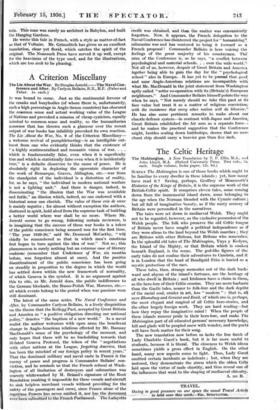A Criterion Miscellany
Faber. Is. each.)
IT was bound to come. Just as the sentimental fervour of the cranks and busybodies (of whom there is, unfortunately, such a high percentage in Anglo-Saxon countries) has obscured the common sense and actual working value of the League of Nations and provoked a miasma of cheap cynicism, equally inimical to common sense and reality, so -the humanitarian nonsense that has thrown such a glamour over the recent output of war books has infallibly provoked Its own reaction. The Lie About the War, No. 9 .of the Criterion Miscellany— a welcome revival of pamphleteering—is an intelligible out- burst from one who evidently thinks that the existence of " a highly sentimentalized and romantic vision of war, . . . which is fundamentally false, even when it is superfically true and which is statistically false even when it is incidentally true," is a definite disservice to-the cause of peace. He is absolutely right in deploring the egocentric character of the work of Remarque, Graves, Aldington, etc.—war from the standpoint of the individual is a distortion of reality, for, as he says, " the individual in modern national warfare is not a fighting unit." And there is danger, indeed, in disseminating " the illusion that the War was avoidable and futile," an illusion which, indeed, no one endowed with a historical sense can cherish. The value of these cris de cceur is mainly negative ; for almost without exception the authors, shattered in spirit, hold aloof from the supreme task of building a better world where war shall be no more. Where Mr. Jerrold seems to go wrong, following certain reviewers, is in imagining that the success of these war books is a token of the public conscience being aroused now for the first time.
The year 1929-30," said Mr. Desmond McCarthy, " will chiefly be remembered as that in which men's emotions first began to turn against the idea of war." Not so ; this phenomenon is surely nothing but an extreme case of literary snobisme (remember that Undertones of War, six months before, was forgotten almost at once). And the positive disenthralment of the public conscience has been going on steadily in proportion to the degree in which the world has settled down within the new framework of normality, of which Geneva is the symbol. It is no argument against this to cite, as Mr. Jerrold does, the public indifference to the German blockade, the Russo-Polish War, Morocco, etc.— all which events belong to the period when war passions were still dominant.
The latest of the same series, The Naval Conference and After, by Commander Carlyon Bellairs, is a lively disquisition On the theme that the Kellogg Pact, accepted by Great Britain and America as " a positive obligation directing our national policy," denotes "the baptism of a new world." As a naval realist the author welcomes with open arms the beneficent ehange in Anglo-American relations effected by Mr. Ramsay MacDonald's sense of the psychology of the moment, and only hopes that there will be no backsliding towards that ill-fated Geneva Protocol, the token of the " negotiations with other nations at the League, forgetting America, that has been the mischief of our foreign policy in recent years:' That the donihiant military and naval caste -in France is the enemy of peace and progress is Commander -Bellairs' con- viction, and he reminds us that the -French refusal at Wash- ington of all limitation of destroyers and submarines was scarcely whitewashed by M. Briand's signature of the Root Resolution (making it impossible for these vessels and aircraft to sink helpless merchant vessels without providing for the safety of the passengers and crew), since France alone of the ,maritime Powers has never. ratified. it, nor hits,.the document evelleen. siitimittia to the French Parliament. TheLafayette credit was obtained, and then the matter was conveniently forgotten. Now, it appears, the French delegation to the Naval Conference has disinterred the project for " humanizing' submarine war and has ventured to bring it forward as French proposal ! Commander Bellairs. is here voicing the feelings of the great majority of his countrymen. The crux of the Conference is, as he says, "a conflict between psychological-and material schools. . .• over the wide world.". Not all of us, however, despair of Great Britain and America together being able to gain the day for the '" psychological school " also in Europe..- It has yet to be• proved that good and sane Anglo-American relations are incompatible with what Mr. MacDonald in the joint statement from Washington aptly called "active co-operation with its (Britain's) European neighbours." And Commander Bellairs himself points the way when he says, " Not merely should we take this pact at its face value but treat it as a matter of religious conviction; with the insistence that-every other nation will do likewise." He has also some pertinent remarks to make about our chaotic defence system—in contrast with Japan and America; Great Britain established the Air arm as a separate force— and he makes the 'practical suggestion that the Conference might, besides scaling down battleships, decree that no mer- chant ship should carry a heavier gun than live inch.










































 Previous page
Previous page